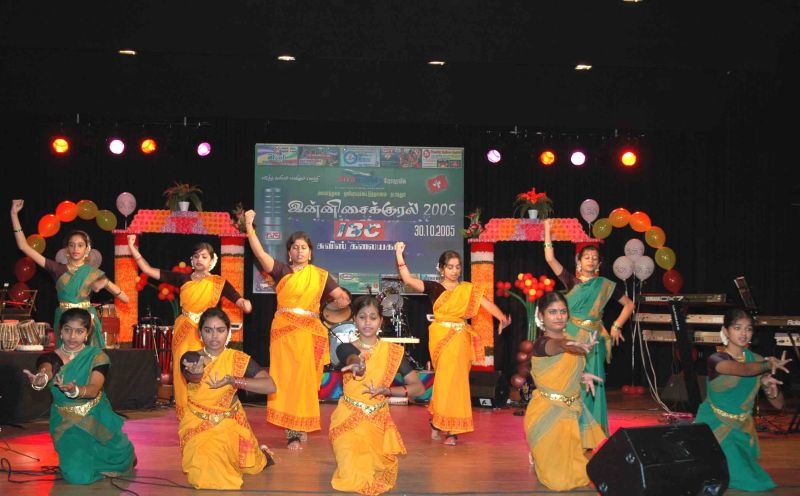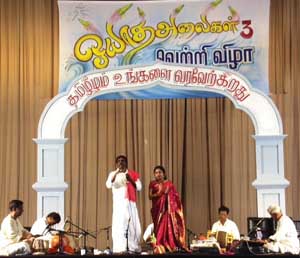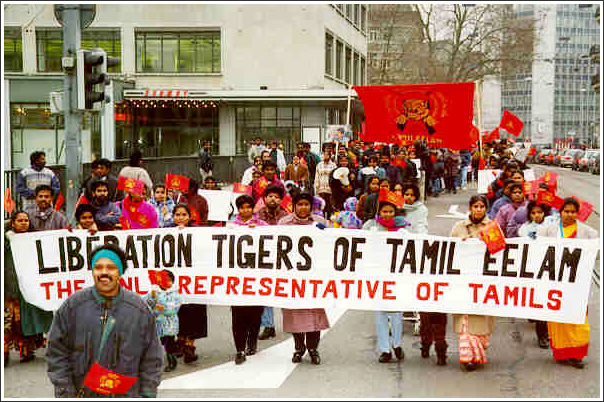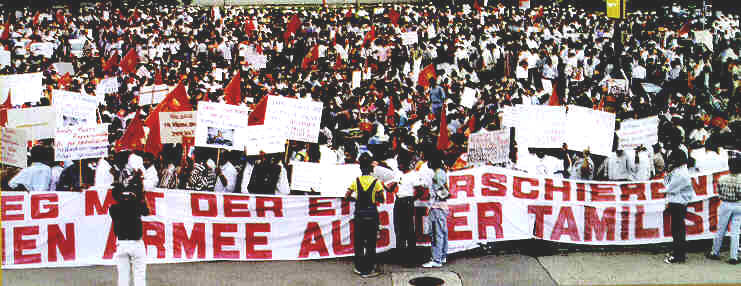CONTENTS
OF THIS SECTION
Last updated
23/07/07 | | கறுப்பு ஜூலை நினைவாக "சாவிலும் வாழ்வோம்" நினைவு கூரல், 22 July 2007 | | Tamil Forum Switzerland - Press Conference on Humanitarian Disaster on Sri Lanka, 11 June 2007 | | Tamils March towards United Nations, Geneva - 11 June 2007 | | Info Tamil in Swiss German | | Young Tamils in Switzerland Commemorate 32nd Death Anniversary of First Tamil Martyr, Urumpirai Sivakumaran, 10 June 2006 | Swiss Tamils look to preserve their culture
18 February 2006 | | Tigers in the Alps - Ramachandra Guha in Himal South Asia, May 2003 | | Switzerland: A Tamil Asylum Diaspora - Urmila Goel, 2001 | | Tamil Electronic Library - Dr.K.Kalyanasundaram | | Swisstamil | | Geneva Tamil Suvadi | | Swiss Tamilan | Tamil Youth Organisation, Switzerland - தமிழ் இளையோர் அமைப்பு | | Jaffna Hindu College Old Boys Association, Switzerland | | Sivan Temple, Glattbrugg, Switzerland | | International Federation of Tamils, Geneva, Switzerland | | The Alps Koothadigal - சுவிஸ் தமிழ் நாடகக் கல்லூரி பற்றிய விவரணப் படம் - Anton Ponraj "'Alps Koothadigal' is a documentary about Sri Lankan Tamil theatre activities in Switzerland. ...the Sri Lankans stage dramas to express their views about the ethnic crisis in Sri Lanka and they have taken the drama medium, as plays have wide reach in the international arena... |
| Switzerland -சுவிற்சர்லாந்து
- an estimated 40,000 Tamils live in Switzerland -
| Tamils in Switzerland Demonstrate in Berne in Support of Struggle for Tamil Eelam, 29 May 2006 
[see also Tamils demonstrate in Australia, Canada, France, Germany,
Netherlands, Norway, Sweden, Finland, Italy, United Kingdom, South Africa]
| 
சுவிஸ் பேர்ண் தலைநகரில் நடைபெற்ற
ஐ.பி.சி தமிழின் இன்னிசைக் குரல் 2005-ன் படத்தொகுப்பு
| Tamils Rehabilitation Organisation - Switzerland 
Swiss TRO assists 26 Volunteers from Switzerland to help the displaced in Tamil Eelam, 9 January 2005
| Swiss Tamil Educational Project in Information Technology for Homeland
தாயகத்திற்கான சுவிஸ்தமிழர் கணனித்தகவல் தொழில்நுட்பக்கல்வித்திட்டம் முலம் உங்களை வரவேற்பதில் பெருமகிழ்ச்சியடைகின்றோம் நோக்கம்: தாயகத்திலுள்ள பின்தங்கிய பிரதேச மாணவர்களுக்கு கணனிக்கல்வியைக்கற்பித்தலும் தொடர்ந்து மேம்படுத்தலும். | 
Thousands Celebrate
Fall of Elephant Pass, May 2000
| 
Swiss Tamils March in Support of LTTE
| 
Swiss Tamils Rally in Support of Struggle for Tamil Eelam, Geneva
|  Swiss Tamils look to preserve their culture Swiss Tamils look to preserve their culture
18 February 2006, Swissinfo
Tamils first came to Switzerland in the 1980s as refugees fleeing civil war in Sri Lanka and now make up a sizeable community in the country.
Although they encountered prejudices at first, Tamils are now regarded as having adapted well to their new home. But they are still not fully integrated.
In 1983 the Tamil Tigers group began fighting for a separate homeland for ethnic Tamils in Sri Lanka, claiming discrimination by the majority Sinhalese. The conflict escalated and many Tamils fled abroad to Europe and North America.
An estimated 35,000 Tamils now live in Switzerland, of which ten per cent are naturalised Swiss. The ex-pat community is now one of the largest after those in Canada, Germany and Britain.
However, the arrival of Tamils in the mid-1980s was not without consequences. The authorities were forced to set up a special refugee authority in 1986 to cope with the unprecedented deluge of Tamil asylum seekers. Prejudice and xenophobia were also commonplace.
"The reception was very harsh, very aggressive, and for us it was also the first time we had been to Europe and experienced the cold snow," said Anton Ponrajah, the head of the Swiss Federation of Tamil Associations. "For both sides it was a difficult situation." He said that some Swiss distrusted the Tamils' motives at first.
"In earlier times, when we were in the asylum centres, people thought we were taking their tax money... but later on the government allowed the refugees to work in Switzerland and this tendency changed," he told swissinfo.
The Tamil population have built up a reputation as good workers, particularly in the hotel and catering industry, which has helped integration.
The community is also well organised. In some cities there are regular showings of Tamil-language films, Tamil newspapers are freely available and there are now more than 20 Hindu ? the main Tamil religion - temples and a string of grocery shops across the country.
But appearances can be deceptive, warns Damaris Lüthi, an ethnologist at Bern University, who has just published a study on Tamil integration in Switzerland. Lüthi says that from a structural point of view, Tamils are well integrated. They know how to negotiate the education and health systems and the workplace. But she says socially and culturally it's a different story. Contact tends to take place within the community and Sri Lankan values are still valid, especially for the first generation.
"The confrontation [between their values and those of] Switzerland and the West in general is still difficult," Lüthi told swissinfo. "Even for those who have lived in Switzerland for 20 years, alcohol consumption, divorce and sex outside marriage, for example, are still very stigmatised and considered to be immoral."The second generation is better integrated but many still subscribe to the old ways, even if they have no intention of returning to Sri Lanka, says Lüthi.
This can be seen in attitudes towards marriage. Most weddings still take place between people of the same social caste ? despite moves in Sri Lanka to outlaw the caste-system. "If two young people from different castes get married, they are often isolated," Lüthi explained. "And even when love marriages are spoken of, they are normally between the same caste." Unions between Tamils and Swiss are very rare. At the end of 2004, of the 18,000 people of Sri Lankan origin who married in that year, only 521 wed a Swiss.
"These types of marriages are not well accepted," said Lüthi, citing several examples of when Tamil families have cut ties with their children for marrying outside the community.
For Ponrajah, integration is still an ongoing process. "It's not a tablet that you can swallow and it will work - it will take time to understand each other. This is the basic thing for integration." |
|
![]()